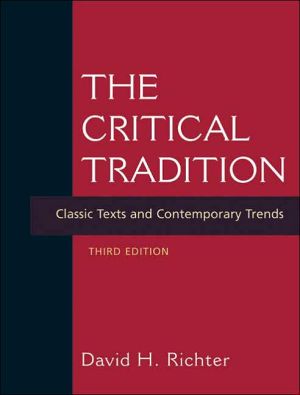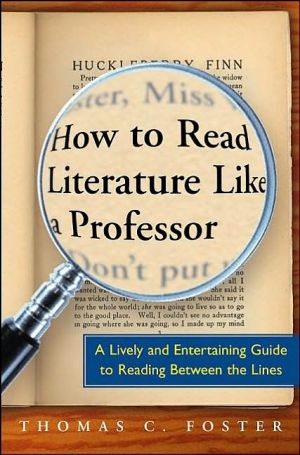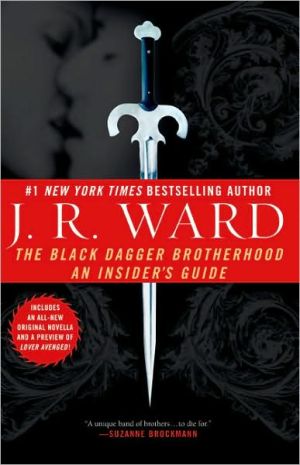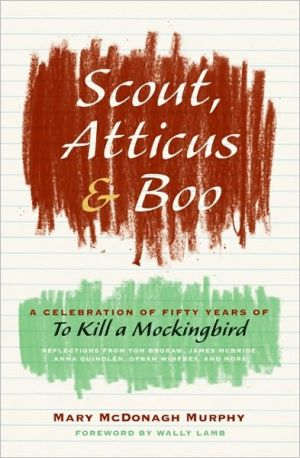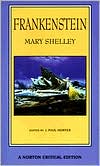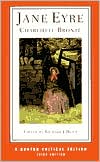Critical Tradition: Classic Texts and Contemporary Trends
This bestseller balances a comprehensive and up-to-date anthology of major documents in literary criticism and theory -- from Plato to the present -- with the most thorough editorial support for understanding these challenging readings.
Search in google:
This bestseller balances a comprehensive and up-to-date anthology of major documents in literary criticism and theory -- from Plato to the present -- with the most thorough editorial support for understanding these challenging readings.
Preface Introduction PART I. CLASSIC TEXTS IN LITERARY CRITICISM Plato, Republic Book X Ion *from Phaedrus *DIALOGUE: To Plato Leo Tolstoy, from What Is Art? Aristotle, Poetics Horace, The Art of Poetry Longinus, from On the Sublime Plotinus, On the Intellectual Beauty Dante Alighieri, from the Letter to Can Grande della Scala Christine de Pisan, from the Querelle de la Rose Sir Philip Sidney, An Apology for Poetry John Dryden, An Essay of Dramatic Poesy Aphra Behn, An Epistle to the Reader from The Dutch Lover Preface to The Lucky Chance Alexander Pope, An Essay on Criticism Samuel Johnson, The Rambler, No. 4; Rasselas, Chapter 10; from Preface to Shakespeare David Hume, Of the Standard of Taste *DIALOGUE: To David Hume Barbara Herrnstein Smith, from Contingencies of Value Immanuel Kant, from Critique of Judgment *Mary Wollstonecraft, from A Vindication of the Rights of Woman Germaine de Staël, Essay on Fictions On Women Writers Friedrich von Schiller, from On Naive and Sentimental Poetry William Wordsworth, Preface to Lyrical Ballads Samuel Taylor Coleridge, Shakespeare's Judgment Equal to His Genius from Biographia Literaria 13 and 14 John Keats, from a Letter to Benjamin Bailey from a Letter to George and Thomas Keats *Thomas Love Peacock, The Four Ages of Poetry Percy Bysshe Shelley, A Defence of Poetry *DIALOGUE: To Percy Shelley Raymond Williams, from Culture and Society Georg Wilhelm Friedrich Hegel, Introduction to the Philosophy of Art Ralph Waldo Emerson, The Poet Karl Marx, Consciousness Derived from Material Conditions from The German Ideology The Alienation of Labor from Economic and Philosophic Manuscripts of 1844 On Greek Art from A Contribution to the Critique of Political Economy Matthew Arnold, The Function of Criticism at the Present Time from The Study of Poetry Friedrich Nietzsche, from The Birth of Tragedy from the Spirit of Music *from Twilight of the Idols *from On Truth and Falsity in an Extra-Moral Sense Henry James, The Art of Fiction Oscar Wilde, The Decay of Lying Sigmund Freud, Creative Writers and Daydreaming; *from The Interpretation of Dreams *The "Uncanny" *Medusa's Head T. S. Eliot, Tradition and the Individual Talent Carl Gustav Jung, On the Relation of Analytical Psychology to Poetry The Principal Archetypes *W.E.B. Du Bois, On Double Consciousness from The Souls of Black Folk *Criteria of Negro Art Mikhail Bakhtin, from Discourse in the Novel Virginia Woolf, Shakespeare's Sister Austen -- Brontë -- Eliot *The Androgynous Vision *Zora Neale Hurston, What White Publishers Won't Print Martin Heidegger, Hölderlin and the Essence of Poetry *Edmund Wilson, from "Dickens: The Two Scrooges" from The Wound and the Bow Kenneth Burke, Symbolic Action in a Poem by Keats Literature as Equipment for Living F. R. Leavis, from The Great Tradition Jean-Paul Sartre, Why Write? Simone de Beauvoir, Myths: Of Women in Five Authors *J. L. Austin, Constatives and Performatives from How to Do Things with Words Northrop Frye, The Archetypes of Literature Erich Auerbach, Odysseus's Scar Hans-Georg Gadamer, The Elevation of Historicality of Understanding to the Status of Hermeneutical Principle Susan Sontag, Against InterpretationPART II. CONTEMPORARY TRENDS IN LITERARY CRITICISM 1. Formlisms: Russian Formalism, New Criticism,Neo-Aristotelianism Victor Shklovsky, Art as Technique *Vladimir Propp, "Transformations of the Wondertale" from The Morphology of the Folktale *I. A. Richards, The Two Uses of Language *Poetry and Beliefs W. K. Wimsatt and Monroe C. Beardsley, The Intentional Fallacy Cleanth Brooks, Irony as a Principle of Structure *My Credo: Formalist Criticism *DIALOGUE: To Cleanth Brooks R. S. Crane, from "Cleanth Brooks, Or, The Bankruptcy of Critical Monism" 2. Structuralism and Deconstruction Ferdinand de Saussure, Nature of the Linguistic Sign *Binary Oppositions *Roman Jacobson, from Linguistics and Poetics Claude Lévi-Strauss, The Structural Study of Myth Umberto Eco, The Myth of Superman Jacques Derrida, Structure, Sign and Play in the Discourse of the Human Sciences *The Father of Logos from Plato's Pharmacy *Differance Michel Foucault, What Is an Author? Roland Barthes, from Work to Text *Striptease from Mythologies *The Structuralist Activity *The Death of the Author Paul de Man, Semiology and Rhetoric *DIALOGUE: To the Poststructuralists Lawrence Lipking, The Practice of Theory 3. Reader-Response Theory Wolfgang Iser, The Reading Process: A Phenomenological Approach *Hans Robert Jauss, The Three Stages of Interpretation Norman N. Holland, The Question: Who Reads What How? *Stanley Fish, How to Tell a Poem When You See One *DIALOGUE: To Stanley Fish James Phelan, from "Data, Danda, and Disagreement" Judith Fetterley, Introduction to The Resisting Reader Wayne C. Booth, Control of Distance in Jane Austen's Emma Peter Rabinowitz, from Before Reading *Mark Turner, Poetry: Metaphor and Invention *Lisa Zunshine, Theory of Mind and Experimental Representations of Fictional Consciousness *Elaine Scarry, On Vivacity4. Psychonanalytic Theory and Criticism Harold Bloom, A Meditation Upon Priority Peter Brooks, Freud's Masterplot Jacques Lacan, The Agency of the Letter *The Mirror Stage *The Meaning of the Phallus *Slavoj Zizek,Courtly Love, or Woman as Thing. Laura Mulvey, Visual Pleasure and Narrative Cinema Hélène Cixous, The Laugh of the Medusa *DIALOGUE: To Helene Cixous Toril Moi, from Appropriating Bourdieu: Feminist Theory and Pierre Bourdieu's Sociology of Culture 5. Marxism Walter Benjamin, The Work of Art in the Age of Mechanical Reproduction Georg Lukàcs, The Ideology of Modernism *Bertolt Brecht, The Popular and the Realistic *Theodor W. Adorno and Max Horkheimer, The Culture Industry: Enlightenment as Mass Deception from Dialect of Enlightenment *Louis Althusser, from Ideology and Ideological State Apparatuses Raymond Williams, from Marxism and Literature Terry Eagleton, Categories for a Materialist Criticism Fredric Jameson, from The Political Unconscious6. New Historicism and Cultural Studies Michel Foucault, Las Meninas from The Order of Things *Michel de Certeau, Walking in the City from The Practice of Everyday Life Stephen Greenblatt, Introduction to The Power of Forms in the English Renaissance King Lear and Harsnett's "Devil-Fiction" *DIALOGUE: On the New Historicism Frank Lentricchia, from Ariel and the Police *Stuart Hall, Cultural Studies: Two Paradigms *Hayden White, The Historical Text as Literary Artifact Nancy Armstrong, Some Call It Fiction: On the Politics of Domesticity *Laura Kipnis, (Male) Desire and (Female) Disgust: Reading Hustler John Guillory, from Cultural Capital *Lawrence Buell, The Eco-Critical Insurgency7. Feminist Criticism *Gayle Rubin, The Traffic in Women Sandra M. Gilbert and Susan Gubar, The Woman Writer and the Anxiety of Authorship Annette Kolodny, Dancing Through the Minefield *Julia Kristeva, Women's Time Barbara Smith, Toward a Black Feminist Criticism Nina Baym, Melodramas of Beset Manhood *Jonathan Culler, Reading as a Woman *DIALOGUE: To Jonathan Culler Elaine Showalter, Critical Crossdressing: Male Feminists and the Woman of the Year Terry Eagleton, A Response to Elaine Showalter Elaine Showalter, In Reply 8. Gender Studies and Queer Theory *Guy Hocquenghem, Homosexual Desire *Monique Wittig, One Is Not Born a Woman Michel Foucault, from The History of Sexuality *Eve Kosofsky Sedgwick, from Between Men from Epistemology of the Closet *Steven Kruger, Claiming the Pardoner: Toward a Gay Reading of Chaucer's Pardoner's Tale *Michael Warner and Lauren Berlant, Sex in Public Judith Butler, Imitation and Gender Insubordination *DIALOGUE: To Judith Butler Martha Nussbaum, from The Professor of Parody *Judith Halberstam, The Making of Female Masculinity9. Postcolonialism and Ethnic Studies *Gilles Deleuze and Felix Guattari, from Kafka: Toward a Minor Literature Edward W. Said, Orientalism *Benedict Anderson,Origins of National Consciousness from Imagined Communities *Chinua Achebe, An Image of Africa *Homi Bhabha, Signs Taken for Wonders: Questions of Ambivalence and Authority under a Tree Outside Dehli, May 1817 *Gayatri Chakravorti Spivak, Three Women's Texts and a Critique of Imperialism *Ngugi wa Thiong'o Europhonism, Universities, and the Magic Fountain: The Future of African Literature and Scholarship *DIALOGUE: On "Third World" Literature Frederic Jameson, from Third World Literature in the Era of Multi-National Capitalism Aijaz Ahmad, from "Jameson's Rhetoric of Otherness and the "National Allegory" Fredric Jameson, A Brief Response *Barbara Christian, The Race for Theory *DIALOGUE: To Barbara Christian Michael Awkward, from Appropriative Gestures: Theory and Afro-American Literary Criticism Deborah McDowell, from Recycling: Race, Gender, and the Practice of Theory Henry Louis Gates, Jr., Writing, "Race," and the Difference It Makes *DIALOGUE: To Henry Louis Gates's "Signifyin' Monkey" Houston Baker, from Blues, Ideology, and African American Literature *Toni Morrison, Black Matter(s) *Gloria Anzaldua, La consiencia de la mestiza: Toward a New Consciousness *Rey Chow, The Interruption of Referentiality: Poststructuralism and the Conundrum of Critical Multiculturalism"10. Theorizing Postmodernism *Jean-Francois Lyotard, Defining the Postmodern *Linda Hutcheon, Theorizing the Postmodern: Toward a Poetics *Frederic Jameson, Postmodernism and Consumer Society *bell hooks, Postmodern Blackness *Cornel West, Postmodernism and Black America *Jean Baudrillard, Simulacra and Simulations *Donna Haraway, A Cyborg Manifesto: Science, Technology, and Socialist-Feminism in the Late Twentieth Century *DIALOGUE: To Postmodernists: Jurgen Habermas, "Modernity: An Incomplete Project" Chronological Contents Index *new to this edition
